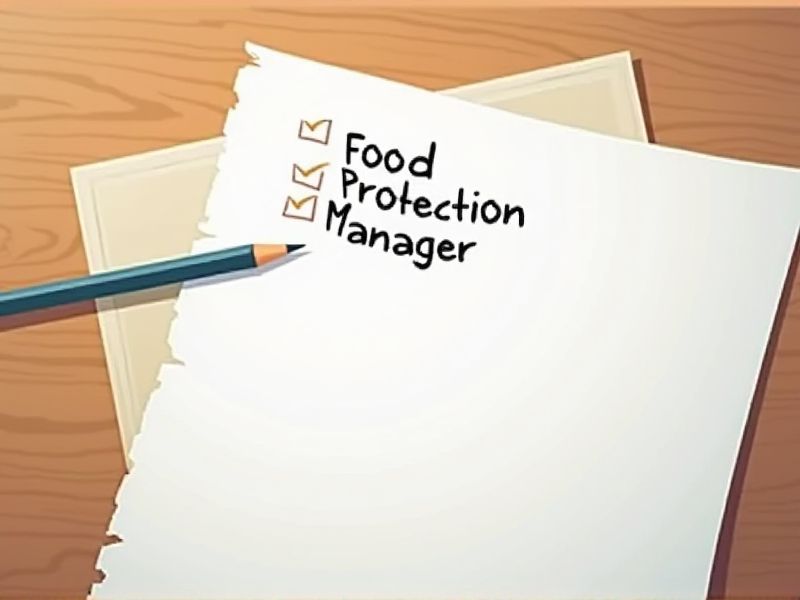
Food Protection Managers play a crucial role in ensuring food safety, and having the right certifications is essential to perform this role effectively. Comprehensive knowledge of food safety protocols, contamination prevention, and health regulations is necessary to protect public health. Certifications validate a manager's expertise in these areas, providing confidence to employers and peace of mind to consumers. Important certifications required for a Food Protection Manager include those related to food safety standards and regulatory compliance.
ServSafe Food Protection Manager Certification
The ServSafe Food Protection Manager Certification demonstrates a comprehensive understanding of food safety practices, which reduces the risk of foodborne illnesses in establishments. A certified manager can ensure compliance with health regulations, potentially avoiding costly fines and closures. This certification equips managers with knowledge to implement effective food safety systems, improving overall operational efficiency. Having a certified manager often enhances customer trust, leading to increased patronage and business success.
National Registry of Food Safety Professionals Certification
The National Registry of Food Safety Professionals Certification validates a food protection manager's competency in food safety principles. This certification ensures that managers understand and can implement critical practices to prevent foodborne illness. Regulatory agencies and employers often require certification to comply with health codes and promote consumer confidence. Certification also enhances the credibility of food establishments by demonstrating a commitment to safety and quality standards.
Certified Professional - Food Safety (CP-FS)
The Certified Professional - Food Safety (CP-FS) credential ensures a thorough understanding of food safety practices, which enhances the capability of a Food Protection Manager to prevent foodborne illnesses effectively. Possessing this certification validates the manager's expertise in compliance with food safety regulations, reducing the risk of legal issues and penalties for the business. This credential provides credibility and trust among consumers, as it signifies the establishment's commitment to stringent safety standards. It equips managers with the skills to train staff adequately, resulting in a consistently hygienic and safe food service environment.
HACCP Certification
HACCP Certification is crucial for a Food Protection Manager because it establishes a systematic approach to identifying, evaluating, and controlling food safety hazards. This certification ensures that managers are equipped to implement preventive measures, reducing the risk of foodborne illnesses. Understanding HACCP principles enables managers to maintain compliance with regulatory requirements, avoiding potential legal issues and penalties. Enhanced credibility and trust from consumers result from certification, which can boost business reputation and customer confidence.
Food Safety Supervisor Certification
Food Safety Supervisor Certification ensures managers possess the necessary knowledge to identify and mitigate potential hazards in food handling. This certification provides formal recognition that a manager has the required expertise to maintain food safety standards, reducing the risk of foodborne illnesses. Regulatory agencies often require such certification to comply with health codes and laws, ensuring that establishments operate within legal frameworks. Training involved in the certification process helps managers train other staff effectively, fostering a safety-conscious culture within the food establishment.
NSF International Food Safety Certification
NSF International Food Safety Certification ensures that Food Protection Managers adhere to recognized safety standards, reducing the risk of foodborne illnesses. By obtaining this certification, managers demonstrate proficiency in implementing and maintaining effective food safety practices. The certification provides assurance to consumers and stakeholders about the safety and quality of food products. It equips managers with updated knowledge on regulatory requirements and industry best practices, enhancing overall food safety management.
ISO 22000 Lead Auditor Certification
ISO 22000 Lead Auditor Certification equips food protection managers with a comprehensive understanding of international food safety standards, enabling them to identify and mitigate potential risks in the supply chain. By acquiring this certification, managers can effectively implement and audit food safety management systems, ensuring compliance with global regulations. The certification enhances the credibility of the food protection manager, reassuring stakeholders about the safety and quality of the food products. Holding this certification often results in improved operational efficiencies and reduced incidents of foodborne illness, which is crucial for maintaining consumer trust and business reputation.
Certified Food Safety Auditor (CFSA)
Implementing a Certified Food Safety Auditor (CFSA) ensures compliance with industry regulations and identifies potential risks in food processes. Increased consumer trust arises when businesses demonstrate adherence to safety standards through CFSA involvement. A CFSA provides expertise in recognizing hazards, leading to proactive risk management and improved food safety outcomes. Continuous auditing by CFSA reduces incidents of contamination, protecting both the brand's reputation and public health.
Global Food Safety Initiative (GFSI) Certification
GFSI Certification establishes a globally recognized benchmark for food safety standards, which directly enhances the credibility of a Food Protection Manager. This certification ensures adherence to international best practices, leading to improved food handling processes that reduce contamination risks. It drives consistency in safety procedures across the supply chain, helping managers identify and mitigate potential hazards efficiently. Compliance with GFSI standards also boosts consumer confidence and aids in meeting regulatory requirements, ultimately protecting public health.
OSHA 30-Hour General Industry Certification
The OSHA 30-Hour General Industry Certification provides comprehensive training on workplace safety standards, directly enhancing a food protection manager's ability to maintain a safe work environment. A deeper understanding of OSHA regulations helps in mitigating hazards related to food handling and storage, thus reducing the likelihood of contamination or foodborne illnesses. Compliance with OSHA standards through this certification can lead to reduced workplace injuries, which directly influences operational efficiency and employee morale. Employers often require such certifications to ensure adherence to legal and safety requirements, enhancing the overall credibility of food safety management practices.
Summary
When you obtain certifications as a Food Protection Manager, you enhance your credibility in the food industry. This elevated status often leads to increased trust from employers and customers, which can result in more career advancement opportunities. As your knowledge of safety protocols grows, you can expect improved operational efficiency in food handling. The rigorous training received through certification also enables you to minimize the risk of foodborne illnesses effectively.
